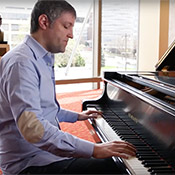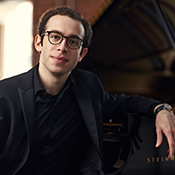
Guest Pianist Jorge Federico Osorio Performs Nights in the Gardens of Spain
David Lewellen
PUBLISHED
Tagged Under: Guest Artist, piano
The Milwaukee Symphony’s upcoming “Sounds of Spain” concert features four pieces from travelers from various corners of Europe looking for a fix of exoticism, and one actual Spaniard. But Manuel de Falla, apart from being Spanish, has a sound all his own.
“You hear two or three minutes of his music and you know that it’s de Falla,” said pianist Jorge Federico Osorio, who will perform Nights in the Gardens of Spain with the MSO “There’s a volcanic energy, something very pointed and intense, that is so important to bring out.”
Osorio, who has played and studied de Falla for decades, says that the composer was “so meticulous in how he wrote, with lots of dynamics and articulations, to the point of being obsessive.” This particular piece “does not pretend to be descriptive but is merely impressionistic,” he said. “They’re sonorous evocations of mystery, but very subjective.”
De Falla notated the piano part very precisely, as was his usual habit, but “it doesn’t take away my freedom” as a performer, Osorio said. “It helps me to have so many nuances and details.”
The other Spanish-influenced works on the program, by French composers Chabrier, Bizet, and Ravel, and Russian Rimsky-Korsakov, go well with the de Falla, Osorio said — and as far as composers borrowing from another culture, “if it helps you bring the music alive, I guess it’s OK.” Guest conductor Jun Märkl has a soft spot in his heart for the Spanish and quasi-Spanish genre; he has led similar programs with other orchestras and conducted Nights in the Gardens of Spain on a previous visit to the MSO in 2016.
But Osorio, as a child in Mexico City, grew up listening to a lot of Beethoven and Brahms. As a professional musician, he was well into the middle of his career before he began seriously exploring Spanish music. Even now, he said, “I have piles of music that I want to go and learn. I also have piles of music that I want to play again.”
Osorio is also a busy recitalist, in a very different world from orchestral performance. “I love to have all the responsibility,” he said. “It could be frightening, but the repertoire we have is so fascinating and beautiful, and there’s so much variety.” Usually during rehearsals, musicians spend time coming to a consensus about how to handle details of a piece, but in a recital, there is no other opinion to consider; “what you do is dictated by the score.”
Of course, multiple musicians can have multiple opinions about what the score means, and there is always the possibility of something new happening in the heat of the moment. “That’s why people come to live concerts,” Osorio said. “They want something different.”
At his MSO concerts this weekend, Osorio will be working with 70 or so musicians and with Märkl, with whom he has never played before. So their meeting before the first orchestral rehearsal, to talk about tempos, cadenzas, and other musical details, will also be a get-acquainted session. “I’m so excited to be working with him,” Osorio said.
In addition to his schedule of orchestra concerts and recitals, Osorio teaches at Roosevelt University in Chicago. “I learn a lot from teaching,” he said. “The students all need different things.” Sometimes that means playing a passage himself and asking the student to duplicate it; more often, in Osorio’s case, it means “having them discover it by themselves. Some lessons, I don’t go near my piano. I focus on finding out what they want to do.”


